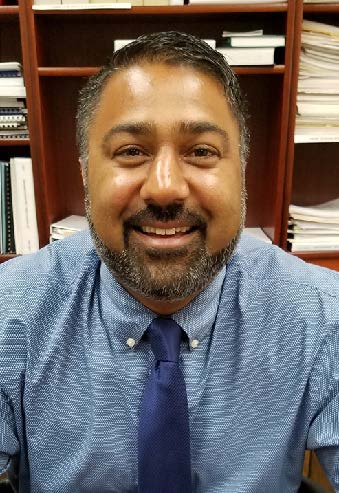Years working in irrigation: 18
Years as manager: 2½
Number of employees: 50–55
Size of service area in acres: 131,600
Amount of water diverted for irrigation per year in acre-feet: 140,000
Main crops irrigated: Vineyards, citrus, almonds,carrots, potatoes, onions
Predominant irrigation methods: Sprinkler, drip/micro
 Irrigation Leader: What are the top issues facing your irrigation district today?
Irrigation Leader: What are the top issues facing your irrigation district today?
Jeevan Muhar: I’d say it is compliance with the Sustainable Groundwater Management Act (SGMA), a 2014 California law that mandates that public agencies reconsider groundwater operations in order to avoid undesirable results with respect to lowering of groundwater levels, groundwater quality, subsidence, groundwater storage, surface/groundwater interactions, and seawater intrusion. In addition, since a majority of our district was built in the 1960s, aging infrastructure is becoming an issue. We’ve got 45 miles of canal, over 200 pumps and motors, and over 170 miles of pipeline.
Irrigation Leader: What future issues are you preparing for?
Jeevan Muhar: Over the next 5 years, I expect we will have a better understanding of what SGMA management will entail and what investments will be necessary to attain sustainability. The first significant deadline is January 31, 2020, when all the basins in the state have to submit their plans to the California Department of Water Resources. While the district can make the argument that we’ve been sustainable for over 50 years, with the future uncertainties with groundwater, our surface water supplies (a portion of which have been devoted to a river settlement), and climate change, we expect to have a deficit relative to historical surface water deliveries and groundwater recharge/banking supplies.
Irrigation Leader: What are your top issues regarding personnel?
Jeevan Muhar: We’ve had several employees reach their 30-year anniversaries, and while they have done a great job, they are not going to work forever. We’ve got to start training employees to do as admirable a job as our experienced employees.
Irrigation Leader: What kind of training do you currently provide to your employees?
Jeevan Muhar: We request that employees cross train to the extent possible. A maintenance employee may fill in for operations, operations staff have learned pump shop duties, etc. This practice ensures that our employees are well rounded and familiar with the entire range of the district’s operations. We also send staff to workshops and seminars that are put on by others, for example the Irrigation Training and Research Center at Cal Poly San Luis Obispo or college or industry courses on issues like aquatic weed control, geographic information systems, and cathodic protection. Other training courses are available through our membership in other organizations, including courses dealing with asbestos pipelines, defensive driving, and harassment.
Irrigation Leader: How much do you spend on training for your employees each year?
Jeevan Muhar: It’s a small fraction of our overall budget. Due to our membership in other organizations, several trainings cost nothing other than normal per diem or hotel charges.
Irrigation Leader: What is the most important thing you have learned as manager?
Jeevan Muhar: Communication is critical. Sometimes I am at fault for not communicating enough. I believe more frequent communication can prevent problems from emerging in the first place. Listen to your employees, understand their issues, and assist in providing the tools that they need to succeed.
Irrigation Leader: What are the top skills needed to be a successful manager?
Jeevan Muhar: You’ve got to be able to communicate and effectively present information. Be thorough and efficiently communicate the issues you’re dealing with in venues like board meetings or committees with fellow managers. You also need to put yourself in others’ positions so that you understand their issues and opposite points of view.
Jeevan Muhar is engineer-manager at Arvin-Edison Water Storage District in Arvin, California. He can be contacted at arvined@aewsd.org.
